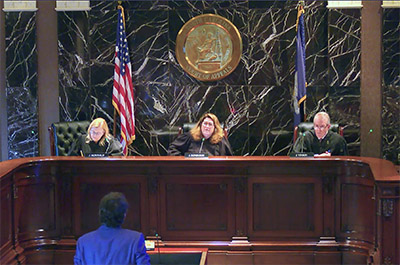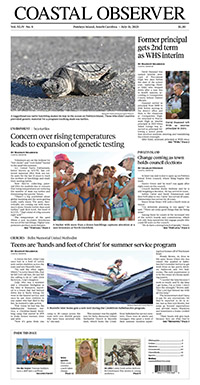Land use
Appeals court judge questions flurry of lawsuits

The first of three lawsuits over land use issues that were dismissed by Circuit Court judges came before the state Court of Appeals this week. It wasn’t lost on the judges that more are on the way.
“It seems to be wildly unpopular what Georgetown County is doing,” Judge Aphrodite Konduros, a member of a three-judge panel, said at a hearing this week. “We’re having a few of these pop up through Georgetown County at the present time, that it’s making the locals very uncomfortable.”
Lawyers for the county and companies that want to develop two tracts in the Parkersville community of Pawleys Island offered explanations.
“We’re here this morning because the appellants of this case did not like the decision of the elected officials of Georgetown County,” said Tommy Morgan, the assistant county attorney. “We would posit that the proper means or methods by which the appellants should challenge this would be the ballot box and not tie up the court system with zoning decisions.”
“I think it’s a little bit of NIMBY – not in my back yard – and a very small population of displeased citizens,” said Matthew Pecoy, attorney for the developers, Laine CRE and Tristar Land.
The suit challenges the site plan approvals for two townhouse developments. The Planning Commission denied approval. The plans were approved by County Council.
Neighboring property owners and the citizens groups Keep It Green and Preserve Murrells Inlet filed suit, saying that under state law the commission’s decision should have been final. Before 2011, site plans were reviewed by planning staff to make sure they followed county zoning and development regulations. The county changed that to include Planning Commission review with a public hearing and final approval by County Council.
At hearings for the two Parkersville projects, as well as others over the years, residents objected to the multi-family projects even though the property was zoned for that type of development. The suit also argues that the zoning was illegal because it conflicted with the future land use maps that are part of the county’s comprehensive plan.
Circuit Court Judge Ben Culbertson dismissed the suit saying it didn’t establish a “justiciable controversy” for which he could grant relief.
The plaintiffs, represented by Keep It Green Advocacy, argued in their appeal that Culbertson improperly based his ruling on the merits of the case rather than whether the filing was “sufficient.”
“The narrow issue before the court is whether the complaint states a claim under the Declaratory Judgments Act,” said Cindy Person, chief counsel for Keep It Green Advocacy.
The judges wanted more.
“I want y’all to really drill down on what exactly in the enabling act prohibited the legislative body, basically the county, from adopting this procedure,” Judge Stephanie McDonald said.
Judge Jerry Vinson wanted to know why the plaintiffs argue that County Council exceeded its authority, a legal argument known by the Latin “ultra vires,” in approving the projects. “We really only look at ultra vires for corporate issues,” he said.
State law sets out the procedure local government must follow to review site plans, Person said. It’s either done by a planning commission or its staff. If a developer doesn’t like a staff decision, it appeals to the commission. If it doesn’t like a commission decision, it appeals to Circuit Court.
“There’s no provision for County Council to reverse the Planning Commission,” Person said.
But that wasn’t the point of the appeal, she added.
“It’s a simple matter of showing that at this stage of the game we had a sufficient complaint that established a controversy that affects the plaintiffs,” Person said. “The bar is not that high.”
Patrick Hubbard, a professor at the University of South Carolina School of Law who works with Keep It Green Advocacy, told the panel that when the county doesn’t follow the procedure in state law property owners are deprived of their rights.
“There’s this list of rights that owners and others are having taken away because the County Council has just thrown out the enabling act provision and started off making it up as they went along,” he said.
Vinson said what the council considered was different from what the commission reviewed. “They made changes that took into account the criticism, both from the public and the staff at the Planning Commission,” he said.
“I’m sorry. I disagree,” Hubbard said. “When it says you must do this, they mean you must do this.”
The council, he added, “started freelancing.” When they did that they were outside the bounds of state law, he said.
But Georgetown County’s procedure isn’t different from what other counties do, Vinson said.
“It’s more complicated than that,” Hubbard said. “If the Planning Commission rejects a plan, the County Council has no power to do anything.”
McDonald said she thought that Culbertson’s order was short on specifics.
“Ben basically just said it’s whether the complaint states a claim in the four corners. You know, that bothers me a little bit,” she said. “But I don’t read the enabling act as prohibiting the county from setting up this type of mechanism.”
While the statute says what a planning commission must do, “it’s a little more complicated than that, as the professor told us,” McDonald said.
The state law also vests authority in the governing body, Morgan said. That is the elected council not the appointed commission.
If the county procedure was wrong, he said, the time to challenge it was when it was adopted in 2011, Morgan said.
Pecoy, the attorney for the developers, argued that Culbertson properly assumed that the facts presented by the plaintiffs were correct and were viewed in the most favorable light.
“The allegations are generally presumed true” when considering a motion to dismiss a case, he said. “The same cannot be said for legal conclusions.”
In rebuttal, Person said she thought the judges misunderstood that the procedure in question was for site plan review, not for zoning changes. For the latter, the law requires the commission to make a recommendation to the council.
She also pointed out that the plaintiffs didn’t appeal the commission’s decision to deny the site plan approval for the townhouse projects because it was a decision they supported.
McDonald said she was still studying whether the process in Georgetown County went beyond the law.
“As I read it, there must be a process. I’m not sure it prohibits more of a process,” she said.
Vinson appeared to agree.
While the state law defines the process for the commission, “that doesn’t mean that’s the end of it. It doesn’t mean that that’s the only way to do it. And as I mentioned before, I think there are other county councils in this state that have a very similar process,” he said.




